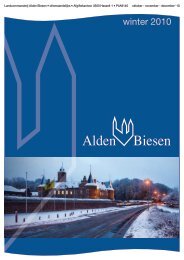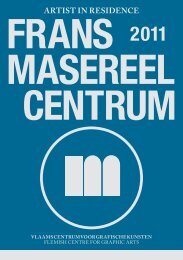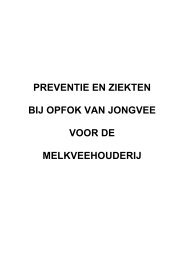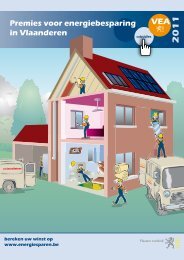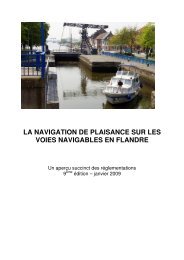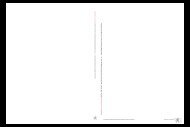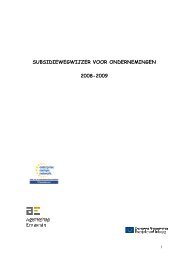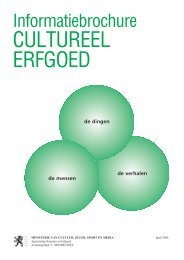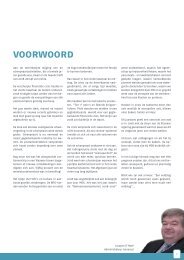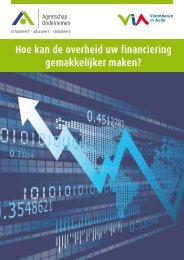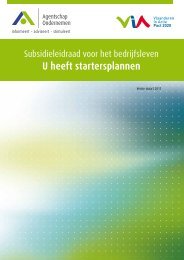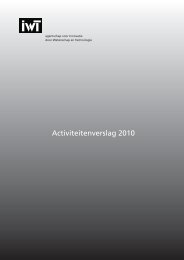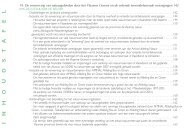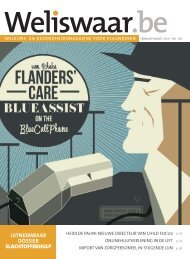Acknowledgements Book of abstracts - Publicaties - Vlaanderen.be
Acknowledgements Book of abstracts - Publicaties - Vlaanderen.be
Acknowledgements Book of abstracts - Publicaties - Vlaanderen.be
You also want an ePaper? Increase the reach of your titles
YUMPU automatically turns print PDFs into web optimized ePapers that Google loves.
Workshops<br />
Workshop 1:Welfare <strong>of</strong> riding horses<br />
Organisers/moderators: Frank O. Öd<strong>be</strong>rg and Marc Pierard<br />
During the first 30 min <strong>of</strong> the workshop a short illustrated survey <strong>of</strong> the horse welfare problems explained in<br />
the two first <strong>abstracts</strong> (housing and schooling) will <strong>be</strong> presented. During the next 30 min people from the<br />
horse industry will <strong>be</strong> given the opportunity to react to this and to explain which strategy they suggest in<br />
order to improve the horse welfare situation. We are therefore setting up a “responding” panel. After the<br />
panel’s first reactions, workshop participants will <strong>be</strong> encouraged to join the discussion during the remaining<br />
45 min.<br />
Workshop 2: Assesment <strong>of</strong> zoo animal welfare<br />
Organiser/moderator: Paul Koene<br />
The workshop is introduced (30 min maximum) by the moderator who introduces the problem <strong>of</strong> assessment<br />
<strong>of</strong> zoo animal welfare shortly (5-10 min) and the other mem<strong>be</strong>rs <strong>of</strong> the discussion panel (Jose Kok <strong>of</strong><br />
Ouwehand Zoo and Ros Clubb from the RSPCA). Jose and Ros as experts in the theme <strong>of</strong> interest present<br />
present their different points <strong>of</strong> view (10 min each). A secretary will take notes during the entire event. The<br />
moderator will open the session for questions and discussion <strong>be</strong>tween the workshop participants and the<br />
panel (60 min). Finally, the outline <strong>of</strong> an article is made, that documents the current status and future <strong>of</strong><br />
assessment <strong>of</strong> zoo animal welfare, based on the workshop contributions and discussion (30 min maximum).<br />
Workshop 3: Do extensive production systems provide high welfare for the animals in those<br />
systems?<br />
Organiser: Cathy Dwyer, Moderator: Pete Goddard<br />
Pete Goddard gives an introduction (total 25 min) to the topic and illustrates potential welfare conflicts (5<br />
mins). Beata Kupiec presents the consumers’ view <strong>of</strong> welfare in extensive systems and impact <strong>of</strong> markets to<br />
affect animal welfare (10 mins). Kate Phillips presents the farmers’ point <strong>of</strong> view and constraints to welfare<br />
provision in extensive systems (10 mins). Open discussion <strong>be</strong>tween workshop participants and panel follows<br />
during 60 mins. Notes are taken <strong>of</strong> the entire discussion by Cath Milne. A summary <strong>of</strong> the final conclusions<br />
to questions proposed in an abstract and outline <strong>of</strong> article documenting current status and future <strong>of</strong><br />
controversy about welfare in extensive production systems.<br />
Workshop 4: Reliability <strong>of</strong> scoring cow lameness<br />
Organiser/moderator: Annelies Van Nuffel<br />
A general introduction on the automatic system to measure cow gait variables and presentation <strong>of</strong> the<br />
Welfare Quality 3-point scale will <strong>be</strong> given by Annelies van Nuffel (5 min). Margot Sprenger continues with<br />
an explanation on categorical versus continuous scoring and presentation <strong>of</strong> the continuous scale (10 min).<br />
Then, there is a 10 min training <strong>of</strong> the scoring system based on a first set <strong>of</strong> videos. There is a short résumé<br />
and participants are grouped for participation in a short experiment (part 1). At 15h00 there is a short break<br />
<strong>of</strong> 5 minutes, followed by a second experiment (part 2). The workshop ends at 15h45 after a 15 min<br />
discussion.<br />
Workshop 5: The effect <strong>of</strong> feed measurements to overcome current and future problems on<br />
farm level with implementation <strong>of</strong> animal welfare legislation<br />
Organiser/moderator: Arno van der Aa<br />
After a short introduction <strong>of</strong> the moderator, Jens H<strong>of</strong>fmann will talk about prevention <strong>of</strong> footpad burns by<br />
using clay minerals (10 mins). The 2nd speaker is Teun Veldkamp; he will speak about reduction <strong>of</strong><br />
ammonia levels within animal farms as result <strong>of</strong> feed measurements (e.g. low protein diets, probiotic<br />
inclusion, effects <strong>of</strong> clay minerals) in about 10 min. After a short summary and statements in a discussion <strong>of</strong><br />
an hour a num<strong>be</strong>r <strong>of</strong> sub questions will <strong>be</strong> covered. Each sub question is introduced with 1 or 2 slides about<br />
independent, published research, to get the discussion going and to see whether new ideas come up as well.<br />
17



